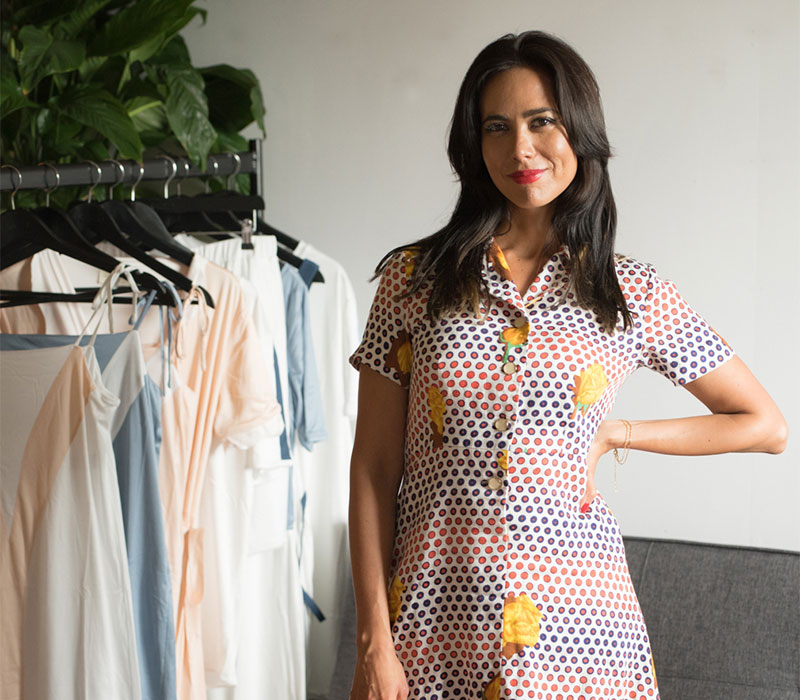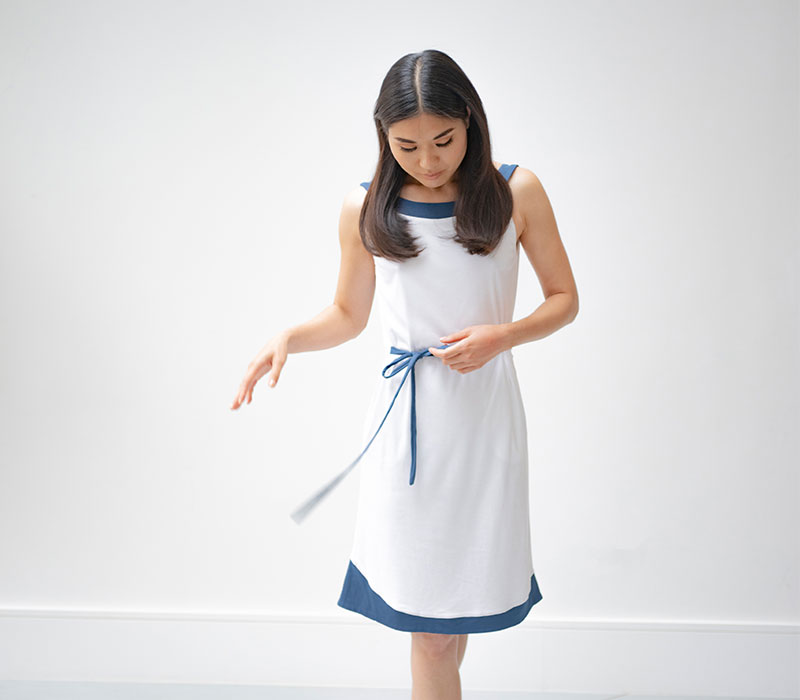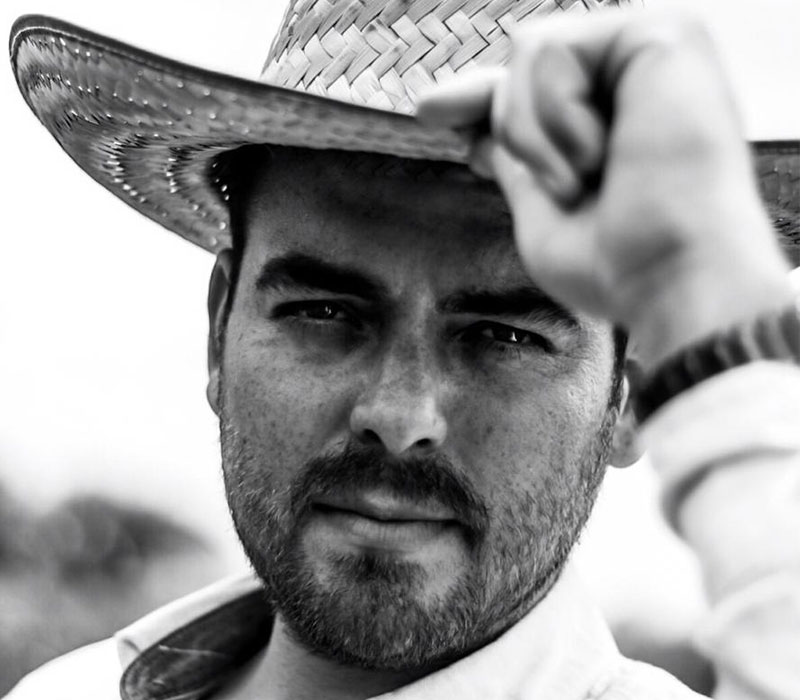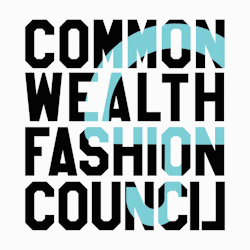Discovering Cruelty-Free
Fashion
By Alanna Fairey
Commonwealth Fashion Content Editor
With consumers becoming more cognizant about living sustainably, there has been a heightened interest in buying cruelty-free fashion.
Cruelty-free fashion does not use animal-based materials, such as leather, feathers, furs, wool and silk. While the use of animal-based materials has caused some controversy in the fashion industry over the years, there has been a shift amongst various brands who made the decision to go cruelty-free.
“Today’s conscious consumers care about the journey that their clothing has taken before reaching their wardrobes –– they’re waking up to the fact that materials derived from animals can never be cruelty-free or ethical,” PETA’s Director of Corporate Projects, Yvonne Taylor, said in a recent interview with The Commonwealth Fashion Council. “Whether it’s the fleece of a gentle sheep who was kicked and punched while being sheared, the skin of a cow who was branded and skinned alive, or feathers ripped from a frightened, restrained goose, parts of animals’ bodies are not fabrics and are not ours to take.”
With the climate crisis at the forefront of people’s minds, Taylor explains that animal agriculture –– including the production of materials used for clothing –– is a leading cause of damaging greenhouse-gas emissions, water pollution and land degradation.
“Studies from within the fashion industry also continue to make the important point that animal-derived materials have a worse impact on the environment than even synthetic materials do,” Taylor shares. “Hides, for instance, are treated with toxic chemicals to prevent decomposition –– so they’re not biodegradable. Raising cows for their skin and sheep for their wool is also a major contributor to methane emissions.”


Unconventional Materials
With designers becoming much more cognizant of cruelty-free fashion and its impact on sustainability, they are shifting towards using more unconventional materials in their designs.
“With materials like hemp, apple and wine-grape leather, organic cotton, seaweed, and pineapple-leaf fibre rising on the market, there is no need and no excuse to turn to cruelty for fashion,” Taylor reiterates. “There are so many sustainable, cruelty-free materials available and upcoming that it’s safe to say that the future of fashion is vegan.”
East London and Milan-based designer Leticia Credidio’s cruelty-free sleepwear and loungewear brand was created when she faced burnout and sleep deprivation, a result of being overworked in her previous career. For Credidio, this forced her to re-evaluate not only the way she was living her life, but what she wanted to do with her career.
“I loved my job, but I think it’s wise for me to quit and create something that could help people to relax, to sleep better, to have a slow life,” Credidio recounts. “I decided to leave my job and then I set it up a business, which promotes slow living.”
Credidio’s brand, which won PETA’s “Designer to Watch” back in 2019, is fully vegan. Most notably, her Ocean collection harnesses certified seaweed fabrics. The collection pays homage to the ocean, and to help bring awareness to the destruction of the coral reefs. For Credidio, this was her way to create something beautiful out of something tragic.
“I needed to create something that is like an homage to our beautiful oceans. We have to protect them. So how can I do that? How can I start this conversation?” Credidio says. “I used this amazing fabric and created the ocean collection. And I love it very much because even if when you watch the garment, the nutrients are still there.”
The Ocean collection’s utilization of seaweed makes the clothes feel soft to the touch and is completely seamless. After getting allergic reactions to certain fabrics, Credidio’s wanted the collection to replicate clothing that represent the ocean. “Seaweed has so many benefits like nutrients, vitamins, and it is really beautiful,” Credidio explains.
Guadalajara, Mexico-based Desserto is a Cactus-based biomaterials as an alternative to leather developed by Adriano Di Marti company. Rather than using animal leather, the company makes apparel, handbags and interiors from cactus leather. Co-founder Adrián López Velarde, says that the company’s decision to manufacture products from cactus was the make a statement on sustainability.
“Our idea at the beginning was to make a fashion brand to get like sustainable materials together and build like a sustainable statement to try to get this message out there,” López Velarde explains. “But then we thought that in Mexico, we don’t have a biomaterial. Why don’t we just make our own instead of importing or looking outside?”
The brand, who was awarded the Compassionate Business Award from PETA in early 2021 and has been collaborating with brands like H&M, seeks to educate consumers about leather and why it is important to buy alternative leather products for the sake of the environment.
“Leather like is not a premium, nice material to wear –– it’s all chemicals, death and also low ethics in the tanning process. Now we have options that can perfectly replace that,” López Velarde elucidates. “Some people would argue that leather is a by-product of the of the animal or the food industry and if they didn’t transform it into like garments, it would be waste and, from a non-vegan point of view, that will be valid, it was not for the large amount of noxious chemicals that the tanning industry use. After its process there, it’s not a skin. It is already a chemical product.
Adds López Velarde: “I think that people need to know more about this.”

Looking Ahead
With more and more brands shifting to cruelty-free products, cruelty-free fashion will soon become the standard practice in the fashion industry.
“I think people are becoming wiser and I wiser and I hope in the future is going to be like this is there’s no other way,” Credidio speculates. “I think most [consumers] are becoming more attentive, and that’s how I envision in few years’ time. The words ‘sustainability’ and ‘cruelty-free’ will just be everyday business – there’s no other way.”
In López Velarde’s perspective, the future of the fashion industry lies in cruelty-free products and brands that have sustainability credentials.
“When people start to move away from cruelty materials like leather, they fall into the vegan leather trap, which is something that means basically for the industry, is not made with animal contents, and that can be PVC as well,” López Velarde explains. “We need to look for bio-based materials, plant-based materials –– those are the solutions that are available nowadays. And that’s like a misconception that we have to be aware of.”
Adding that it is a step in the right direction for consumers to step away from animal cruelty, López Velarde maintains that there is no reason to keep wearing animal skin when clothing can be manufactured from cactus or other plants.
“I had this conversation a few weeks ago with a good friend of mine and I was telling him that if you were given the choice to wear leather or cactus, or if you have a knife and there’s a cow and there is a plant, which one would you put to make your garment? I think by my by nature, we will go for something that it’s ethical that it’s right.
Concludes López Velarde: “We have to change and we can’t just accept things just because they have been that way for a long time. I think it’s time to change.”



